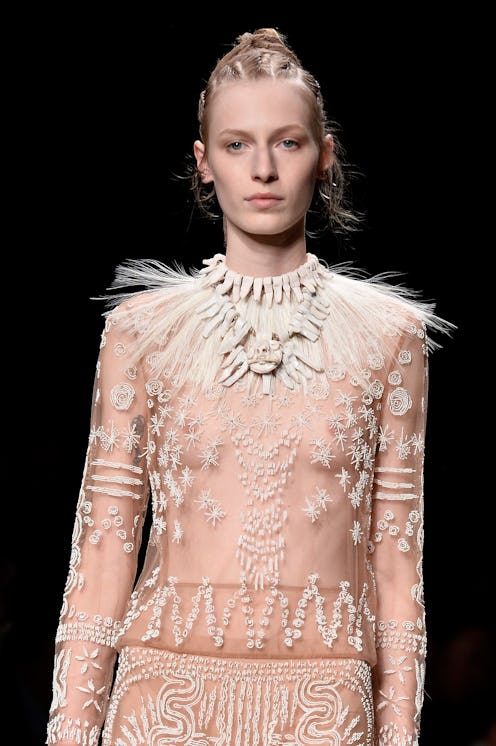During Paris Fashion Week, Valentino's spring/summer 2016 collection called to mind a whimsical vibe with its lace detailing, wisps of sheer material, and silhouettes that ran down bodies like liquid silk. But with its delicateness came something a little more questionable: A striking sense of cultural appropriation thanks to the fanciful Africa-themed collection that used almost all white models.
As reported by African news and business site AFK Insider, the runway show was inspired by the whole continent of Africa (which is taking generalizing to a whole other level, IMO) and, according to Valentino, was an "an exploration of 'vibrant Africa,' calling it 'primitive, tribal, spiritual, yet regal.'" Cringing use of outdated adjectives aside, being inspired by a vague sense of a culture is problematic in and of itself, according to Ellen Scott at Metro, "Given the whole, ‘We’re going to try to use our perception of an entire continent’s general culture to sell fancy clothes,’ thing." Valentino has not yet responded to Bustle's request for comment over the backlash.
The show was centered around tribal necklaces, beaded belts, feather and fringe detailing, kikuyu prints, and cornrows, yet 91 percent of it consisted of white models, with only eight out of the 87 models being women of color, according to Metro. When you opt to use almost all white models for an Africa-inspired show, begin to weave dreadlocks and cornrows into their hair, and then send them out to the tune of bongos, you have to expect a few people to get offended.
Lamentably, this isn't the first time Valentino has been accused of cultural appropriation. The brand also featured white models in cornrows in its pre-fall 2015 lookbook. As Bustle's own Kristin Collins Jackson wrote, "People of color have inspired numerous fashion trends throughout American history and most often than not, the credit is never given to us. Credit doesn't have to be an article introducing a trend titled 'Thanks, black people, for telling us {blank} is cool,' but to have Valentino feature at least one WOC in their lookbook would have been nice."
As always, the Internet has had a lot to say.
Here's hoping brands learn from these critiques and strive to find ways to celebrate a culture without doing it a disservice in the process.
